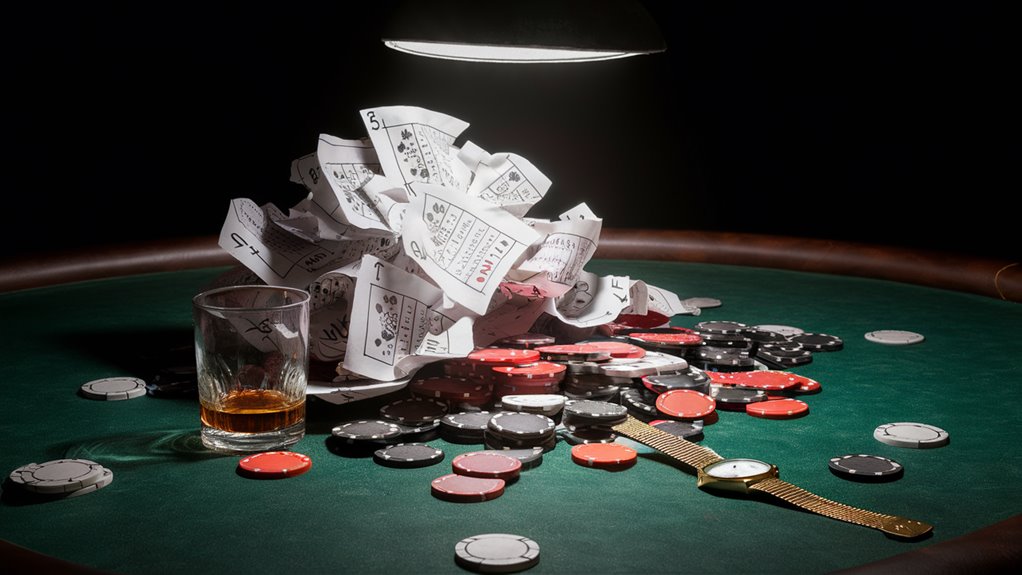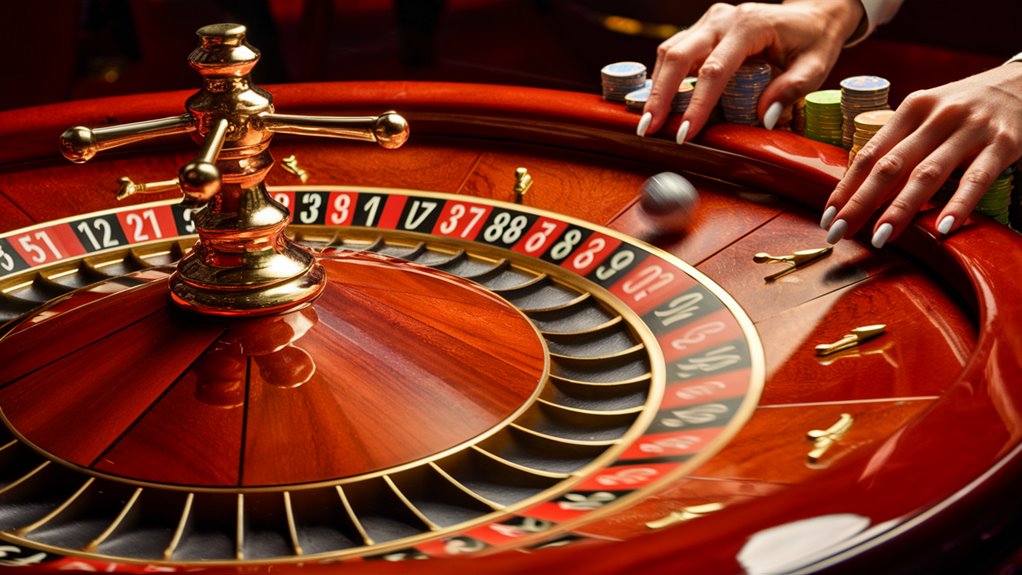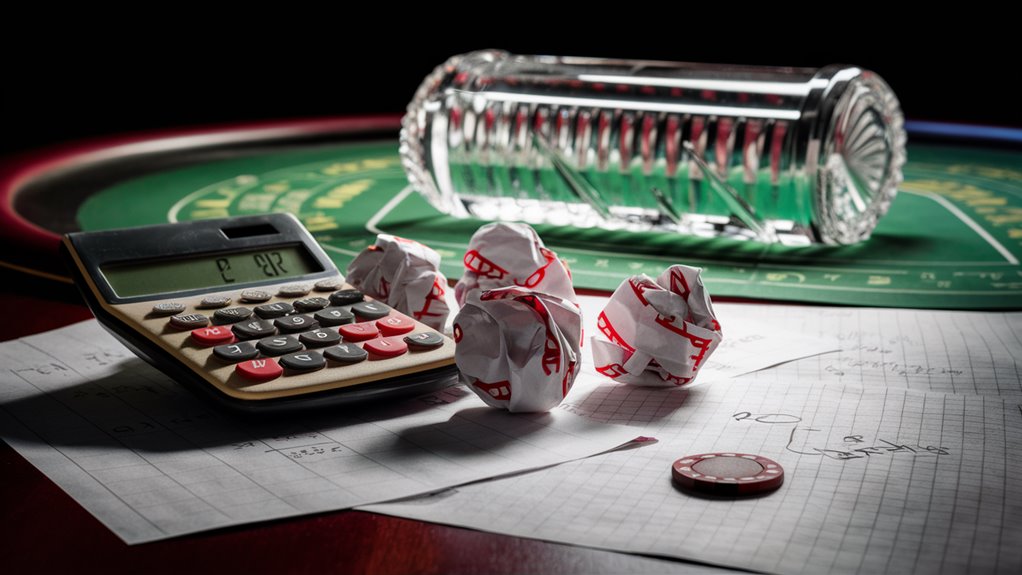The Biggest Errors Gamblers Make
Explaining Important Pitfalls In Gambling
Recreational betting can easily turn into an unhealthy habit through problem gambling behaviors. Knowing exactly what these major gambling mistakes are helps you stay in control and gamble responsibly.
Six Gambling Mistakes To Avoid
Chasing Losses
Chasing losses is the most common and devastating gambling error. Players raise their wager in an effort to recoup past losses. This can form a vicious cycle that results in increasing financial damage and emotional pain.
Gambling Without a Budget
The significant risk arises from poor bankroll management through undetermined spending limits. Setting and sticking to a strict gambling budget is crucial for playing responsibly.
Mixing Alcohol and Gambling
Drinking alcohol greatly influences the decision-making process, so the gambler’s judgment in the gambling absorbing sessions is less acute. Betting sober plays an important step in making better decisions.
Disregarding Mathematical Odds
And since they don’t get the house edge or probability mechanics, they have unrealistic expectations. The mathematical negative of each game needs to be recognized and included in betting strategies.
Emotional Betting
People make bad choices based on emotional triggers instead of calculated analysis. Keeping a clear head is important to making good gambling decisions.
No Clear Exit Strategy
Encouraging random, unlimited gambling leads to prolonged sessions and heavier losses. Having definite stopping points helps to guard against gambling too much.
Protective Measures Implementation
Identifying these behaviors is the first step, followed by implementing responsible gambling strategies. Self-exclusion tools, professional support, and strict financial limits protect one from developing problematic gambling behavior.
Chasing Losses at All Costs
The Psychology and Risks of Chasing Gambling Losses
What Is Loss Chasing Behavior?
Loss chasing is one of the most damaging gambling behavior patterns, where the gambler attempts to recover previous losses by continuing to increase their stake. This compulsive behavior often results in devastating financial losses and fractured relationships as players take increasingly high risks.
What Causes Loss Chasing From a Neuroscience Perspective
Loss chasing is a state when the brain is activated to the extreme, buttoning the fight-or-flight response. This physiological response floods you with cortisol and adrenaline, crippling your ability to think rationally. This emotional state crumbles rational thinking into a How to Build a Winning Sports Betting Strategy secondary priority behind recovery-focused impulses, which is where the cycle becomes dangerous.
Prevention Techniques and Risk Mitigation
Setting Strict Loss Limits
Having a predefined threshold for losses acts as vital protection against chasing behavior. Once you reach this limit, you cannot gamble anymore; it is not negotiable.
Recovery Techniques
Do some deep breathing exercises
Get out of gambling environments
Self-exclusion from gambling venues
If you are supported by these tools, turn to professional gambling counseling
Long-Term Protection
To prevent financial calamity, strict limits must be enforced and losses treated as irreversible decisions — the best plan to stop the bleeding. If self-control techniques are not working, professional support has to be taken into consideration.
Breaking the Cycle
The realization that loss-chasing causes orders of magnitude more financial devastation is the basis for the behavioral engineering. However, risk management protocols and professional intervention can aid the individual in establishing a healthier form of gambling, or cessation entirely, if they have succumbed to gambling addiction.
Playing Without a Clear Budget
As with any finance-related venture, setting a gambling budget is very important.
Setting Clear Financial Boundaries
Set Financial Boundaries Before You Bet: Responsible gambling starts with defining absolute financial limits before you engage in any gambling behavior. The worst thing that a lot of players do is enter casinos or online betting sites without a strict budget in place. It is a sure way to make poor decisions that can put a strain on your finances.
How to Set a Gambling Budget That Works
Funds spent on gambling should be treated purely as a form of entertainment costs, not as potential income source. To ensure financial sustainability, there need to be both per-session limits and monthly budgets.
These limits must be:
Written down clearly
Easily accessible during play
Distinct from basic living costs
Non-negotiable once reached
Strategic Budget Management
Recreational gamblers who win do not take chances — they use concrete systems to keep their gambling in check. Key strategies include:
Setting up specific gambling accounts
Preloaded value dollars attached to prepaid cards
Conducting gambling in a physical space separate from their personal finances
Maximize your gambling expenses as you do for entertainment tickets
Each pathway in the structure of your bankroll management presents crucial barriers that promote discipline during gameplay while simultaneously reducing the risk of making emotionally driven decisions during a session.
Mixing Alcohol With Gambling
Alcohol and Gambling: The Deadly Combination
The Link Between Alcohol and Gambling
Gambling with alcohol consumption can prove to be a perilous mix for the choices made in casinos and gambling venues. This dual activity severely hampers cognitive ability, resulting in elevated risk-taking behavior and concession to emotional play and betting, which diverge from logical gameplay methodology.
Brain Chemistry
In terms of gambling, it may have the greatest effect on the area of the brain that governs executive function and risk assessment, the prefrontal cortex. Research shows that alcohol thwarts:
Impulse control mechanisms
Financial judgment
Loss perception
Skills for strategic thinking
Statistical Significance of Gambling Behavior
Clinical studies show that inebriated gamblers display a predictable pattern of behavior:
Higher betting amounts
Extended playing sessions
Reduced compliance with betting limits
More chase betting being done
Risk Mitigation Strategies
Responsible Gaming Practices
Separating drinking from gambling elements is significant with regards to responsible gaming. Setting firm personal rules: Any gambling session means no booze.
Ability to Make Clear Decisions
Dry run check of various pre-defined budgets
Strategic gameplay execution
Identification of proper stopping places
Guidelines By Asian Casino Experience
As such, here are some basic rules to maintain good gambling evaluation:
- Set strict limits on how much you are willing to bet when you go to a casino
- Avoid drinking during gambling sessions
- Save drinking for after the game
- Physically distance yourself from gaming areas while drinking

Ignoring the House Edge
The Casino House Edge: A Harsh Reality
The Amazing Truth — Casino Petty Advantages
The casino house edge is an inescapable mathematical advantage that guarantees gambling venues profits in the long run. So, many players like to think they can compensate for this built-in advantage with strategies or systems, but the statistical facts say otherwise.
House Edge Key Percentages by Game
Different casino games come with different house edge percentages.
Blackjack: 0.5% to 1% given the player uses the optimal strategy
Slot machines: 2% to 15% variance
American Roulette: 5.26% house edge
European Roulette: 2.7% house edge
The Effect of Mathematics on Gambling Results
The expected losses over a long period of play are directly proportional to the house edge percentage. This mathematical principle applies even when you have a winning streak for some time or believe you may have a pattern.
Knowing these percentages present for each game How to Make Smart Bets in Horse Racing allows you to make informed decisions about what games to play and how to manage your bankroll.
Decisions in Gaming: A Strategic Approach
A good gambling strategy consists of:
Picking games that have small house edges
Statistical probability is everything to understand
Setting strict loss limits
Realizing that no betting system beats the built-in edge
Setting realistic expectations about possible outcomes
Game Selection and Risk Management
It is greatly advised that players focus on games with better odds and stay away from high-house advantage games. It won’t always win, but it will maximize your chances if you want to play longer and helps you get more value for your entertainment dollars spent at casinos.
Betting Based on Emotions
Betting With Your Heart: How to Make Rational Betting Decisions
Gambler’s Emotions: The Psychology of Betting
Gambling losses: The role of emotional decision-making While there is also a rational analysis, the decision behind gambling loss lies primarily with those related to emotions.
When there are streaks of wins or sequences of losses, cognitive judgment is greatly inhibited from extreme measures of arousal. Psychological triggers can cause players to make riskier decisions, often leading them to suffer significant financial losses.
Detecting Emotional Triggers for Gambling
Gamblers’ behavioral tendencies often align with certain emotional states:
Stress-induced betting
Depression-related gambling
Escapism through wagering
Overconfidence after wins
Loss-chasing behavior
Betting these ways makes it easy to place controlled 먹튀사이트 bets. Enforcing tight betting limits is the first line of defense against emotional gambling. So bankroll management needs to stay the same in spite of emotional highs and lows. These can serve as critical safeguards against an emotionally impulsive response.
Keys to Keeping Your Emotions in Check
Assessments on a regular basis seem to be necessary to keep tabs on betting. Make a Gambling Activity Journal. The gambling activity journal helps players:
Track emotional states
Document betting patterns
Analyze decision triggers
Monitor win-loss ratios
Do this with self-awareness techniques
Professional Gambling Techniques
If you are already a gambler who is successful, it requires emotional intelligence in addition to disciplined strategy.
You rely on data up until October 2023.
Sustainable gambling success begins with decision-making that is clear-minded.
Not Knowing When to Stop
Not Realizing When It’s Time to Walk Away: A Windfall Guide to Responsible Gambling
Establishing Clear Limits When Gambling
These behaviors are the rudimentary tenets of responsible gambling — emotional control and stopping points. The sunk cost fallacy keeps plenty of players chasing losses in a vicious cycle that leaves them in tatters financially.
Setting Limits on Gambling from the Outset
Financial Boundaries
Have a strict loss limit before starting any gambling session
Set session limits and daily thresholds
So never pass set limits in any case
Time Management
Have fixed time limits for gambling sessions
Set timers or alarms to measure session length
Be aware of how much time you are spending gambling
Recognizing the Signs of Problem Gambling
The red flags that indicate going out of control are:
Overborrowing purely for gambling purposes
Hiding gambling activities from others
Feeling anxious when trying to quit
Not being able to walk away once limits are reached
Taking Action
This is where professional help becomes necessary: When there are warning signs.
Desire to get things back on track starts with:
The recognition of the need for support
Searching for gambling counseling qualified
Adopting or implementing tried and tested prevention strategies
Enforcing boundaries hard
Be advised that responsible gambling is an active process which relies on continuous self-monitoring and dedication to setting limits.
This is the only secret for being successful and it is based on acknowledging and respecting these boundaries, without exception.




